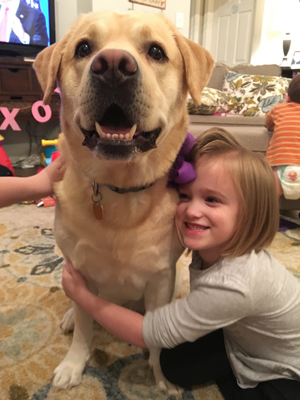 Our family dog is a large two-years-old yellow lab named Ace. He’s a silly pup who sometimes forgets he’s not the same size as a cat. He and Jackson are best buds.
Our family dog is a large two-years-old yellow lab named Ace. He’s a silly pup who sometimes forgets he’s not the same size as a cat. He and Jackson are best buds.
Last summer, Ace started having seizures. The first one I witnessed was terrifying. It took forever to stop. The kids and I were supposed to go to a ballgame with my office, but instead found ourselves in a tiny room at the vet for two hours.
We left traumatized, with an expensive vet bill, and instructions to keep a seizure log for the dog. No problem, right? I have a cancer survivor son and a micro preemie daughter. What’s a canine seizure log to add to my advocacy portfolio?
On the drive home, I looked at that big furry goofball sitting in the passenger seat beside me, scratched his head and felt thankful that at least it wasn’t Abby.
Weird thought?
Not really.
Abby’s IVH (brain bleed) way back during her NICU stay put her at a high risk for having
seizures. With balance and coordination issues that come with cerebral palsy, she’s had several tumbles where she’s bumped her head, but no seizures. Even after her shunt placement this summer, I wondered “maybe,” but she remained seizure free. Following her bath mid-December, she fell and hit her head hard, but still no seizure on impact and she was recovering well. I was feeling confident she was going to be one of the lucky ones.
Ace, poor thing had another seizure Christmas morning. And…Abby had her first seizure three days later.
Whereas I knew what to do with Ace, watching my child have a 20+ minute seizure, riding in the ambulance with her still actively seizing and spending two nights at CHKD was completely frightening.
You can’t go through traumatic times with your kids and come out unscathed. Some experiences, like a seizure, will replay in your head over and over. What could I have done differently? What if it happens again? What if it happens while I’m asleep? What if it happens at school? What if it happens on the bus ride to school? It changes who you are and your concept of normal. It’s always just under the surface.
Coping is different for everyone. What does it look like for me?
- I talk with my sister (who is a CHKD social worker) and write articles like
5 Important Things to Do If Your Child is Having a Seizure. It helps to write down my fears and then talk them through with someone. For you, it might be a friend, family member, social worker, medical professional or therapist who understands.
- I also make notes of what to discuss with Abby’s doctor before her appointments. You’d be surprised the thing you worry about most is squashed in the first minute of your doctor’s appointment. I’ve had plenty of “Oh. Well that answered THAT question!” moments.
- I’m in the process of making a plan with the appropriate staff at Abby’s school. The public school system, or even a private pre-K program like Abby’s, has the ability to accommodate. Safety is everyone’s priority.
- I’ve practiced what to do at home in case an emergency and sent an email with seizure instructions to Abby’s entire family. Even Jackson has learned what to do in case Abby has another seizure. It made him feel better to be prepared, too.
- When something happens to your child, dealing with your own feelings naturally comes last. I know that firsthand.
I also know the more you can process through what happened, the less power your anxiety will have on everyday life. Little by little, with time, the right coping skills and maybe some M&Ms (peanut butter, please), it will get better.
We learned with Ace … it’ll come with Abby.
About Jessica Woolwine

Jessica Woolwine is a native of Hampton Roads and lives in Hampton with her three “miracles” Jackson (9), Abby (5) and Henry (1). As a mother to a childhood cancer survivor and a micro-preemie, she began the blog
Mothering Miracles in 2014 to support other families dealing with health issues. Jessica also works as
Creative Director for Rubin Communications Group and enjoys mixing her talents for graphic design and creative writing with community relations. She is a past member of both the
CHKD Family Advisory Council and the CHKD NICU Family Advisory Council.